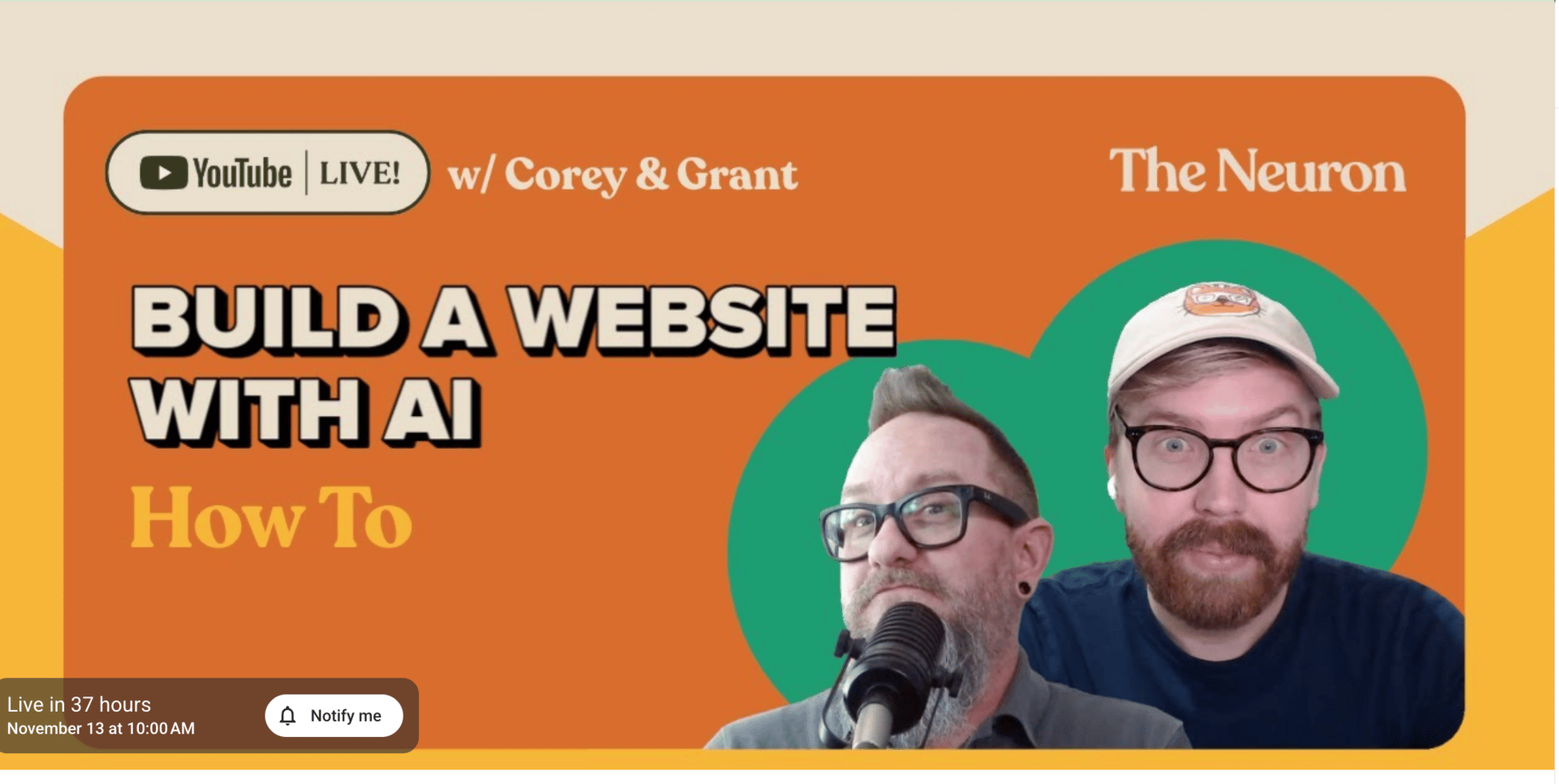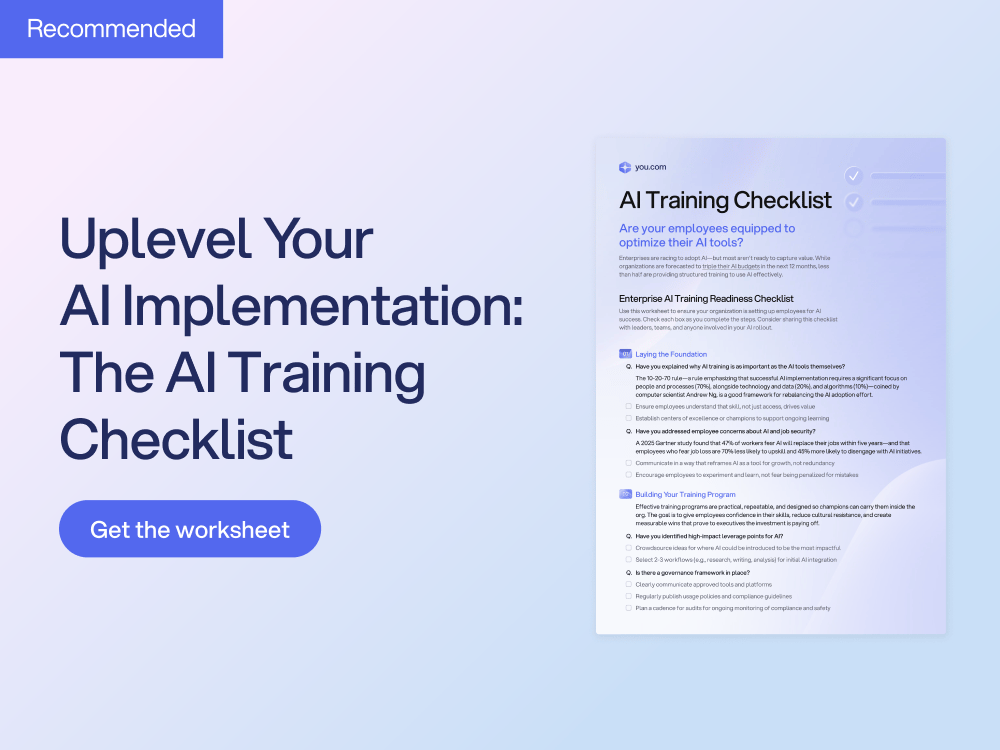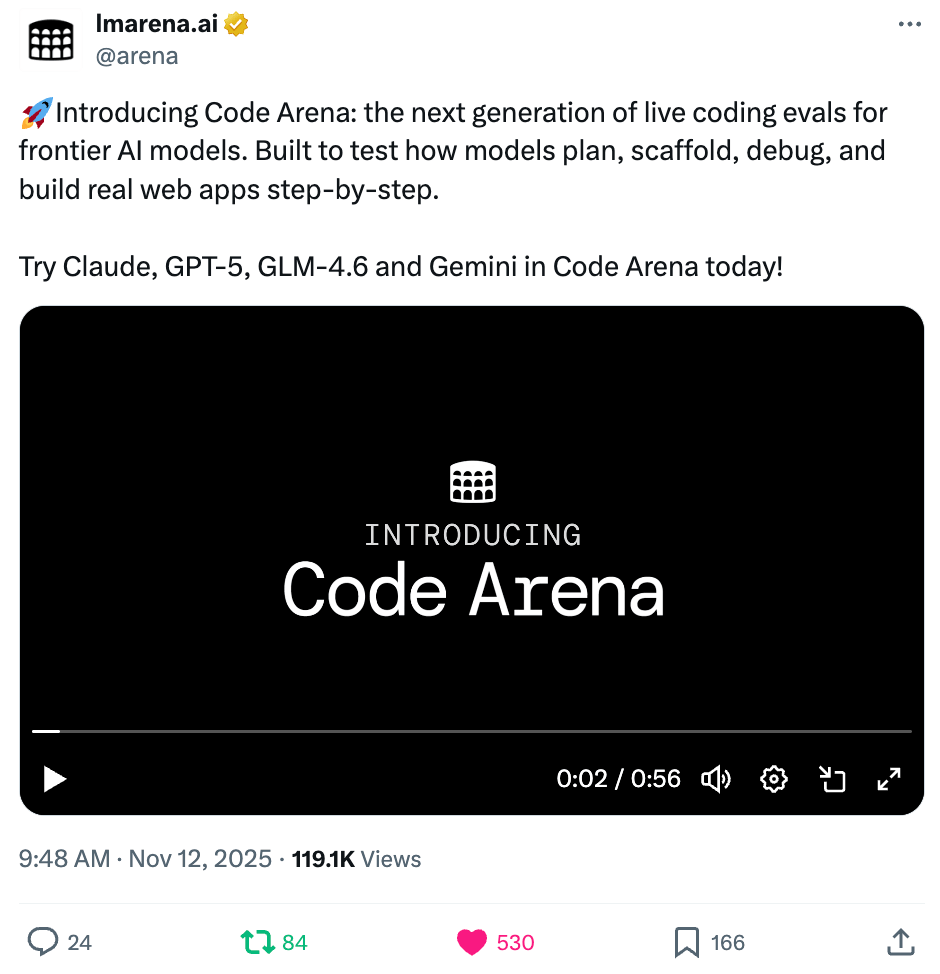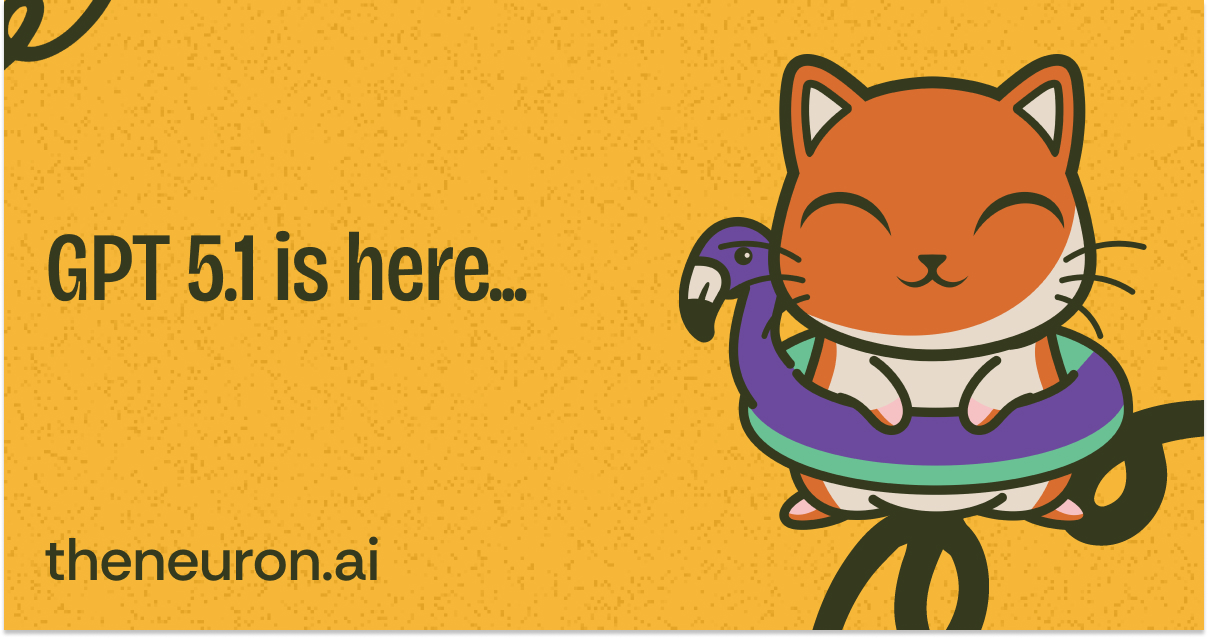Welcome, humans.
Chat GPT 5.1 is out today, and it seems like this update is all about making Chat less annoying to talk to.
The new model is “warmer” and “more conversational,” which in practice means it actually follows your instructions instead of giving you a five-paragraph essay when you the answer warrants six words. It also got better at math, coding, and deciding when it needs to think hard versus when it should just answer quickly.
OpenAI also plugged its new personality settings, which = you can now make ChatGPT “Quirky,” “Candid,“ “Professional,“ or—our personal favorite—“Cynical.“
Worth noting: this is rolling out to paid users first, then free users over the next few days. If you don't see it yet, check back tomorrow.
P.S: Later today at 10am PST / 1pm EST, we're doing something wild: building a full website LIVE using only AI. Zero code, just prompts.

Click the image above → hit the “notify me“ button to get pinged when we go live. Starts in a few hours (joining late? Still pop in and say hi!)
We'll pit ChatGPT, Claude, Gemini Build, Kimi K2, and DeepSite (a free HuggingFace tool) against each other to see which one actually delivers.
Plus, a special guest from Webflow is dropping by to demo their new AI features (which we haven't tried yet, so this should be fun).
Here’s what happened in AI today:
- Microsoft CEO Satya Nadella defended pivoting to agent infrastructure over model competition.
- Waymo launched freeway autonomous rides across three major metro areas.
- Anthropic announced a $50B data center build out.
- Gemini Live got an upgrade to be much more conversationally friendly.

Microsoft CEO Satya Nadella Debated the Future of Microsoft (and AI) with the Patels…

DEEP DIVE: The Key Takeaways of Dwarkesh and Dylan’s epic Microsoft Interview
Remember when Tobey Maguire, Andrew Garfield, and Tom Holland all teamed up in Spider-Man: No Way Home to take down the Sinister Six? The AI media world just had its own crossover moment, except instead of three Peter Parkers, we got two Patels (no relation) taking on one of the biggest bosses of the Mag 7.
In a rare, expansive interview on the Dwarkesh Patel podcast, Dwarkesh and Dylan Patel of SemiAnalysis sat down with Microsoft CEO Satya Nadella inside Microsoft's new Fairwater 2 data center—now the most powerful data center in the world.
Their mission? Stress-test every aspect of Microsoft's trillion-dollar AI gamble with the toughest questions they could think of (btw, if you want to read the full transcript, check it out here, and if you want Dylan and SemiAnalysis' take on the news, read this piece).
The Patels brought the receipts. Satya brought the rebuttals. It's one of the best tech interviews we've seen all year.
It all centers on one question: as AI gets smarter, will value flow to the model makers like OpenAI, or to platforms like Microsoft that provide the “scaffolding” where AI works?
Satya's betting everything on the latter, and defended that position across three key challenges:
- Debate 1: Will autonomous AI agents make Office obsolete?
- The Challenge: The Patels argued that future AI “coworkers” will be able to use any software and freely migrate data, making deep integrations with platforms like Microsoft Office irrelevant. In this case, the model companies would capture all the value.
- Nadella's Rebuttal: He countered that Microsoft is building an “infrastructure business in support of agents.” The game isn't selling tools “per-user” anymore; it's about provisioning a virtual computer, storage, and security “per-agent” (a potentially much larger market).
- Debate 2: Is GitHub Copilot's market share collapse a warning sign?
- The Challenge: Microsoft's share of the AI coding market has plummeted from nearly 100% to under 25% in one year, as competitors with better models gain ground. This proves a superior AI can beat a platform advantage.
- Nadella's Pivot: He's not trying to win the head-to-head fight. Instead, he plans to turn GitHub into “Agent HQ”, a “Mission Control“ dashboard where developers can deploy and manage competing AI agents from a single interface. Microsoft wins by owning the battlefield itself. Als he saw with the cloud, owning a smaller piece of an exponentially larger market is a far greater victory than dominating a small one.
- Debate 3: Did Microsoft blunder by pausing its data center build-out?
- The Challenge: Dylan said that Microsoft's “big pause” on expansion allowed competitors like Oracle to catch up and even surpass them in projected capacity. So they essentially gave up the massive bare-metal hosting business.
- Nadella's Defense: It was a strategic choice to avoid becoming a low-margin “hoster for one company” (a.k.a OpenAI) and getting stuck with old hardware. The long-term plan now is to build a more flexible, global, and profitable network for a diverse set of customers and regions.
Why this matters: You should watch this to hear Satya Nadella's strategic playbook for AI, how Microsoft plans to ride Moore's Law by deliberately not overbuilding one hardware generation, why Satya believes multiple models will always coexist rather than one dominant generally intelligent model, and his surprisingly candid admission that if American tech companies (and America in general) loses the world’s trust, the US could lose its position as "50% of global market cap” despite being only 4% of the population.

FROM OUR PARTNERS
One major reason AI adoption stalls? Training.

AI implementation often goes sideways when teams lack well-defined goals, or a clear framework. This AI Training Checklist from You.com pinpoints common pitfalls and guides you to build a capable, confident team that can make the most out of your AI investments.
What you'll get:
- Key steps for building a successful AI training program
- Guidance on overcoming employee resistance and fostering adoption
- A structured worksheet to monitor progress and share across your organization
Set your AI initiatives on the right track: get the checklist.

Prompt Tip of the Day
Are your LLM agents stateless and forgetful? This new context engineering guide from Google’s Kimberly Milam and Antonio Gulli breaks down why static system instructions aren't enough. Building truly intelligent agents means dynamically assembling the entire context payload for every single turn.
Think of it as the agent's mise en place:
- The Recipe: Your static system prompt.
- The Ingredients: The dynamically retrieved stuff: conversation history, RAG results, tool outputs, and long-term user memory.
The paper provides a deep dive into the two pillars of this: Sessions (the temporary “workbench“ for one chat) and Memory (the persistent “filing cabinet“ for all chats).
It even covers how to manage “context rot“ (when models get confused by long histories) using compaction strategies.
Our favorite insight = the clear line drawn between RAG and Memory. RAG makes an agent an expert on facts (like a research librarian). Memory makes it an expert on the user (like a personal assistant). One provides world knowledge, the other provides personalization.

Treats to Try

Code Arena benchmarks AI coding models by watching them build full apps in real-time, showing you which ones perform best (read more).
- Gemini Live now speaks faster, uses accents, and sounds more expressive—so you can speed through a lecture review on your way to class or practice Spanish with real-time conversation.
- Marble turns your single image, video, or text prompt into a high-fidelity 3D world you can explore and interact with.
- VibeThinker-1.5B cost only $7600 to train, and tackles advanced math and code challenges, beating models 400x larger on AIME (GitHub).
- AI Autocomplete suggests everything you need to say upfront in chat interfaces—so you can book a flight or buy products in one message instead of a back-and-forth conversation.
- GC AI drafts contracts and reviews legal docs in seconds, cutting your team's reliance on outside lawyers (raised $60M).
- Tavus creates lifelike video agents that see, hear, and respond to you in real-time like having a face-to-face conversation with a tutor, therapist, or assistant (raised $40M).
- Code Metal translates your code between programming languages automatically, so you don't rewrite features for each device (raised $36M).
- Insight Prism generates a prioritized AI roadmap for your business in under two weeks, mapping out use cases that could save you 100,000+ hours annually or cut call handling times by 60%.

Around the Horn
- OpenAI was ordered by a German court to pay damages for violating copyright law by training ChatGPT on licensed music without permission, and separately asked a New York judge to reverse an order requiring it to turn over 20M ChatGPT chat logs in The New York Times' copyright lawsuit.
- Waymo began offering freeway trips for autonomous rides across San Francisco Bay Area, Phoenix, and Los Angeles, and also expanded its Bay Area coverage to San Jose.
- Timothy B. Lee of Understanding AI is probably the best writer covering Waymo, so check out his piece on the news here, which frames this announcement in context of the milestone AND the competition.
- Google DeepMind published a paper on their AlphaProof, system, which achieved silver medal performance at IMO 2024, and another paper on using “odd one out” cognitive tests (similar to human visual percetion) to make the models more robust, reliable, and better at tasks like few-shot learning.
- Anthropic announced a $50B investment to build data centers in Texas and New York with Fluidstack (read more).
- Ed Zitron claims to have viewed documents revealing both OpenAI’s inference costs with Microsoft and Anthropic’s inference costs with AWS; this X post from Signull explains why this is a problem… if they can’t raise more capital, they can’t subsidize these costs for users (related: the essay called Cursor’s problem which basically says Cursor needs to work like an insurance company and price risk of power-users accordingly).

FROM OUR PARTNERS
All your customers, understood.

Unwrap's AI-powered platform aggregates and analyzes customer feedback across channels and proactively surfaces emerging isUpdatesues to the right teams before impact grows. Get data-backed insights to build your product roadmap.
See how DoorDash, Clay, WHOOP, Stripe, lululemon and others power their customer intelligence with Unwrap.

Thursday Trivia
We’re going to try something new today… today’s Thursday Trivia will be shared and played LIVE on the stream at 10AM PST / 12PM CST. Come join us to play live!
(Don’t worry - we’ll send the Trivia again directly in the email on Sunday so folks who can’t play today can get to cast their votes as per usual :D )

A Cat’s Commentary


.jpg)

.jpg)






.jpg)


